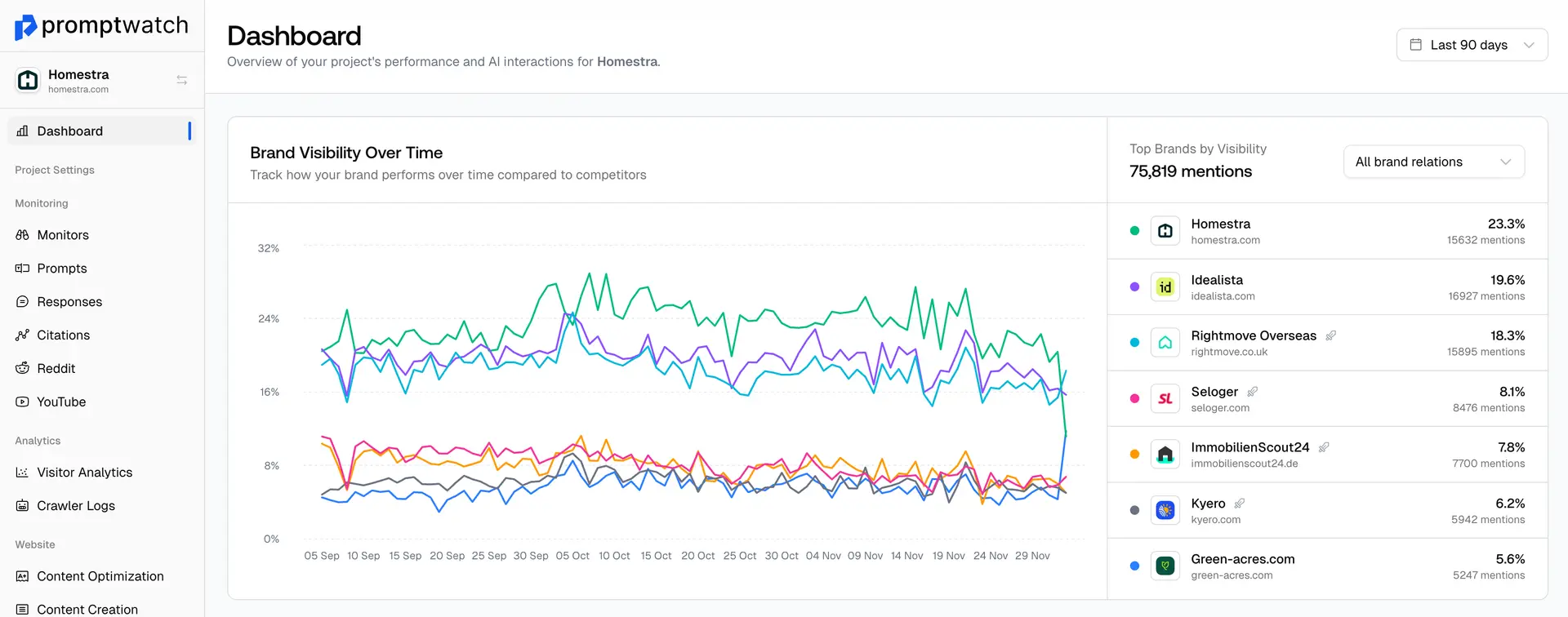For months, marketers have been scratching their heads wondering: How exactly does ChatGPT search the web? We knew it uses Bing under the hood, but when users ask ChatGPT a question that needs current info, what specific search queries does it actually craft behind the scenes? The AI doesn't just throw random searches at the wall - it's way more strategic than that, but until now, we've had zero visibility into this process.
That all changed this week. ChatGPT quietly started including the actual search queries it generates (tucked away in the response metadata) when it performs web searches. For the first time ever, we can peek behind the curtain and see exactly what ChatGPT searches for.
At Promptwatch, we've been collecting and analyzing this brand-new data since ChatGPT first started exposing these search queries just a few days ago. We've gathered 5,513 real ChatGPT prompts that triggered web searches, revealing key insights about AI search optimization.
The Hidden Search Engine Behind ChatGPT
When ChatGPT decides it needs fresh information, it doesn't just search once. It typically generates 2-3 strategic search queries to gather comprehensive results. Think of it like having an expert researcher who knows exactly which questions to ask to get the best answers.
Through Promptwatch's data collection, we're seeing this systematic approach play out in real-time across thousands of interactions. Even with just a few days of data, the patterns are crystal clear.
ChatGPT Is a Two-Query Machine
Here's the first big revelation: 90% of prompts generate exactly 2 search queries. ChatGPT has figured out that a primary query plus a backup query gives it the best coverage:
- 2 queries: 4,981 prompts (90%)
- 1 query: 524 prompts (9%)
- 3 queries: 8 prompts (<1%)
This isn't random - it's incredibly strategic. The first query goes straight for the most direct answer, while the second query provides alternative angles or broader context.
Natural Language Dominates
ChatGPT searches like a real human, using natural language phrases that average 6.4 words and 48 characters:
- Short queries (≤3 words): 2.6%
- Medium queries (4-7 words): 72.6%
- Long queries (≥8 words): 24.8%
Instead of searching "pizza NYC," ChatGPT searches "best pizza restaurants Manhattan 2024" or "authentic Italian pizza New York reviews." It's like having a conversation, not barking keywords.
Intent Drives Everything
The type of question completely shapes how ChatGPT searches:
| Intent Type | Most Common Query Type | Share |
|---|---|---|
| Informational | Organic searches | 96% |
| Branded | Brand-specific searches | 80% |
| Commercial | Competitor comparisons | 60% |
Nearly 50% of all prompts are Informational-Organic combinations. People are mainly asking ChatGPT to explain stuff, provide analysis, or share knowledge - not to buy products or navigate to specific sites.
Brands Get Embedded, Not Isolated
When ChatGPT searches for branded content, it doesn't just search the brand name by itself. Instead, it creates these really contextual queries:
- ❌ "Tesla"
- ✅ "Tesla Model 3 safety ratings 2024"
- ✅ "Tesla vs BMW electric vehicle comparison"
This means your brand needs to be discoverable in context, not just sitting there in isolation.
Competitor Comparisons Are Everywhere
For commercial queries, 60% involve competitor comparisons. ChatGPT actively hunts for comparative information, using patterns like:
- "[Brand A] vs [Brand B] pricing comparison"
- "[Product] alternatives better than [Brand]"
- "[Service] reviews compared to [Competitor]"
If your brand isn't part of these comparison conversations online, you're basically invisible to ChatGPT's commercial research.
The Data Behind the Insights
Our Promptwatch analysis covered 5,513 prompts with 16,539 potential search query slots. Here's what we found:
- Query completion rate: ≈64% (10,510 of 16,539 slots filled)
- Query distribution: Almost always query1 and query2; only 0.1% of prompts have a third query
- Average query length: 6.4 words, 48.4 characters
- Query range: 1-16 words, 7-117 characters
Intent and Type Breakdown
| Intent Type | Brand | Competitor | Organic | Total |
|---|---|---|---|---|
| Branded | 907 | 40 | 189 | 1,136 |
| Commercial | 84 | 831 | 476 | 1,391 |
| Informational | 64 | 44 | 2,757 | 2,685 |
| Navigational | 9 | 1 | 7 | 17 |
| Transactional | 6 | 0 | 20 | 26 |
Informational-Organic queries alone account for ~50% of all prompts in our dataset.
Real Examples: What the Data Actually Looks Like
To give you a concrete sense of how ChatGPT transforms user prompts into search queries, here's a sample from our Promptwatch dataset. Each row shows the original user prompt and the two search queries ChatGPT generated:
| Intent | Type | User Propt | Query 1 | Query 2 |
|---|---|---|---|---|
| Informational | Organic | What's the best place in San Antonio to buy a certified pre-owned Mercedes-Benz? | certified pre-owned Mercedes-Benz dealership San Antonio | best place to buy certified pre-owned Mercedes Benz San Antonio |
| Informational | Organic | I'm looking for a high-tech SUV with great driver-assistance features. | best high tech SUVs driver assistance 2025 | high tech suv with advanced driver assistance features review |
| Commercial | Competitor Comparison | What are the best project management tools for small teams? | best project management tools small teams 2024 | project management software comparison small business |
| Informational | Organic | How do I choose the right CRM for my startup? | best CRM software startups 2024 | how to choose CRM system small business | |
| Commercial | Organic | I'm looking for a digital marketing agency that offers transparent reporting. Any recommendations? | best marketing agencies with detailed reporting | |
| Informational | Organic | What are the key features to look for in accounting software? | best accounting software features small business | important features accounting software comparison |
| Commercial | Competitor Comparison | How do cloud storage services compare in terms of security? | cloud storage security comparison 2024 | best secure cloud storage services comparison |
| Informational | Organic | What's the difference between different types of business insurance? | types of business insurance explained | business insurance coverage comparison guide |
This represents just a tiny slice of our 5,500+ prompt dataset that we're collecting through Promptwatch. Notice how ChatGPT consistently generates natural language queries that capture both the specific intent and broader context of each user's question.
What This Means for Your Business
1. Optimize for Natural Language
Your content should answer questions the way people actually ask them, not just target keywords. Think "How to choose the best CRM for small business" rather than "CRM small business."
2. Create Comparison-Friendly Content
Since 60% of commercial queries involve comparisons, create content that positions your brand alongside competitors. Comparison pages, feature matrices, and "vs" content become absolutely crucial.
3. Answer Informational Queries First
With informational content dominating, you need to establish authority by thoroughly answering questions in your space before pushing for sales.
4. Think in Query Pairs
Since ChatGPT typically uses two queries, make sure your content can be discovered from multiple angles. Create both broad overview content and specific detail pages.
5. Context Is King
Brands aren't searched in isolation. Make sure your content connects your brand to relevant contexts, use cases, and comparisons.
Advanced Insights from the Data
Intent drives query type strongly: 96% of Informational prompts use Organic queries; 80% of Branded prompts are Brand-specific; Commercial leans hard (60%) into Competitor-comparison.
Informational queries run a bit longer: Avg ≈ 7.1 words vs 6.1–6.5 for the other intents.
Brand names get embedded naturally: Branded queries rarely stand alone ("Homestra second-home Europe" rather than just "Homestra").
Competitor comparisons read like mini-questions: Typical pattern: "[Brand] vs [Brand] pricing [location]" - longer, multi-entity phrases that clarify the comparison dimension (price, rating, etc.).
Sparse use of third query: When present it is usually a very long reformulation, hinting the model is "hedging" with a broader variant.
No ultra-long "sentence" queries: Hard cap at 16 words / 117 characters shows the prompt engineer (or the model) avoids full-sentence paraphrases that search engines often truncate.
The New Search Reality
ChatGPT isn't just changing how people search - it's changing what gets found. Traditional SEO focused on ranking for single keywords. ChatGPT search optimization requires understanding query intent combinations and natural language patterns.
The businesses that'll succeed in this new landscape aren't just optimizing for Google anymore. They're optimizing for how AI thinks, searches, and synthesizes information.
And here's the thing - this is just the beginning. We're collecting this data through Promptwatch in real-time as ChatGPT's search behavior evolves. What we're seeing today might be completely different in a few months as the AI learns and adapts.
Want to see how your brand appears in ChatGPT searches? Promptwatch tracks your visibility across AI platforms, showing you exactly when and how your brand gets mentioned in AI-generated answers.
Ready to optimize for the AI search era? Start monitoring your AI presence today →




